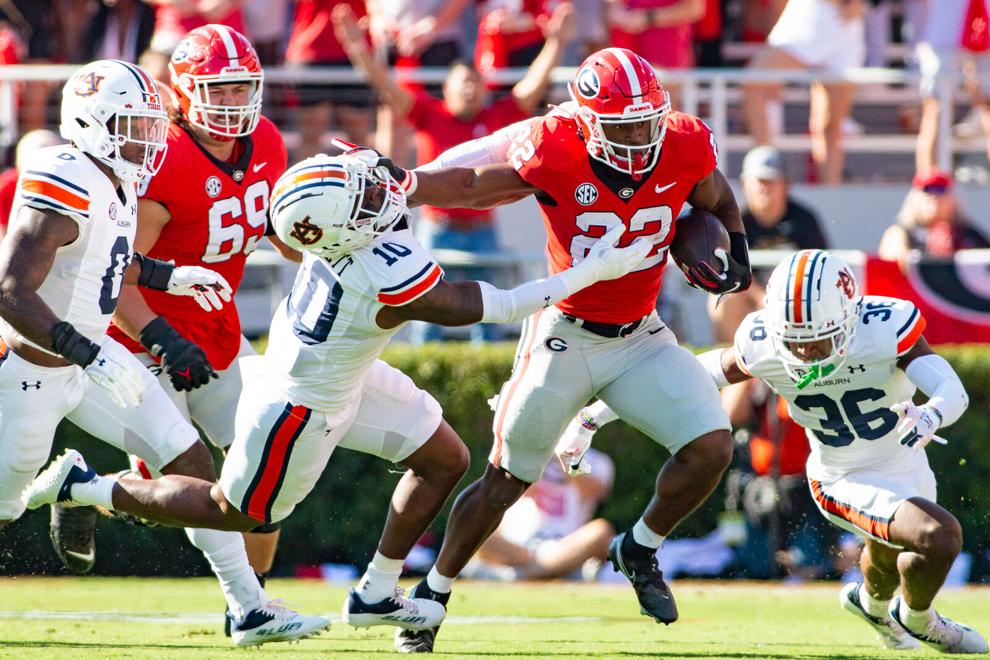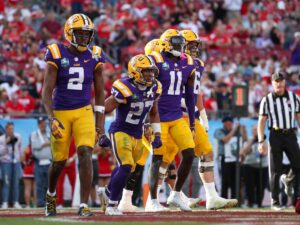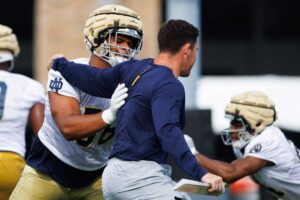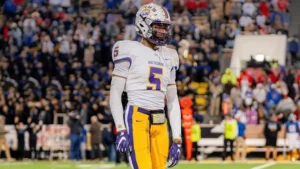
Georgia Running Back Branson Robinson Enters Transfer Portal After Injury-Plagued Start to Career
Branson Robinson arrived in Athens as one of the most heralded running back prospects in the nation. A five-star recruit out of Germantown High School in Madison, Mississippi, Robinson was viewed by many as the next great Georgia tailback—a torchbearer for a program with a rich history at the position. With a build that drew comparisons to NFL legends and a punishing running style that screamed SEC-ready, the expectations for Robinson were sky-high from the moment he signed with the Bulldogs. Now, less than three years into his college career, Robinson’s journey at Georgia has taken an unexpected turn. The bruising back entered the NCAA Transfer Portal this week, marking the end of a tenure that showed flashes of promise but was ultimately marred by injuries.
For Kirby Smart and the Bulldogs, Robinson’s decision to seek a new opportunity elsewhere is a notable development—both because of what it says about the crowded nature of Georgia’s backfield and because of what might have been. Robinson was the kind of player Georgia fans had hoped would continue the tradition of excellence that saw the likes of Nick Chubb, Sony Michel, D’Andre Swift, Zamir White, and James Cook thrive between the hedges. His freshman season in 2022 gave a glimpse of that potential, with Robinson finishing the year with 330 rushing yards and three touchdowns on 68 carries. He showcased his physicality and burst in limited action, often looking like a future feature back waiting for his moment to break out.
That breakout moment never came. Instead, the 2023 season brought devastation. Robinson suffered a ruptured patellar tendon in fall camp—a serious and notoriously difficult injury for any athlete, let alone a running back who relies on explosion and lower-body power. The injury sidelined him for the entire year, and as Georgia marched on toward another College Football Playoff run, Robinson was forced to watch from the sidelines, his development halted and his place on the depth chart in flux.
When spring practice arrived in 2024, it was evident Robinson still had work to do to return to form. The Bulldogs, meanwhile, had reloaded in the backfield. With Daijun Edwards, Kendall Milton (before his own departure to the NFL), and rising talents like Roderick Robinson II and freshman sensation Nate Frazier competing for snaps, the room was as deep and competitive as ever. For a player coming off a major injury and still working his way back into football shape, the writing may have been on the wall.
Robinson’s decision to enter the portal speaks to the broader reality of the modern college football landscape. The NCAA Transfer Portal has given players a new level of agency—especially those like Robinson, whose situations have changed due to injury, roster turnover, or the emergence of younger talent. It’s a system that, in this case, could provide Robinson a fresh start and a better opportunity to earn playing time. While the timing of the move may raise eyebrows among Georgia fans, especially given Robinson’s talent, it’s also a pragmatic one. With his eligibility clock ticking and carries hard to come by in Athens, a change of scenery may be just what he needs to reignite his career.
At his best, Robinson remains a highly intriguing back. Standing at 5-foot-10 and weighing around 220 pounds, he’s built like a tank, with tree-trunk legs and an uncanny ability to break tackles. He’s the kind of runner who wears down a defense over four quarters—exactly the type of back that thrives in the Big Ten or SEC. Assuming he can fully recover from the patellar tendon injury and regain his form, there will likely be no shortage of suitors. Programs looking for a physical, experienced back with a high ceiling could do far worse than betting on Robinson’s upside.
For Georgia, the move underscores a continued evolution in its offensive identity. The Bulldogs are still committed to the run game under offensive coordinator Mike Bobo, but their recruiting and development have also leaned into a more versatile, explosive attack. The depth at running back means the Bulldogs can afford to lose a player like Robinson without necessarily feeling the impact on Saturdays—but that doesn’t make the loss any less significant from a cultural or emotional standpoint. Robinson was a fan favorite, and his weight-room feats as a freshman—videos of him squatting 600 pounds went viral—made him something of a legend before he ever took a snap in Sanford Stadium.
It’s a reminder that not every blue-chip story follows a straight line. Injuries are part of the game, and even the most talented players sometimes struggle to find traction amid the rigors of college football. Robinson’s time at Georgia may not have gone as planned, but it’s far from over in terms of his football journey. Wherever he lands next, he’ll bring with him the lessons learned in Athens, the resilience forged through rehab, and the hunger to prove he’s still one of the best backs in the country when healthy.
Robinson’s departure also raises questions about Georgia’s depth moving forward, especially with the toll of the season and the inevitable bumps and bruises that come with the SEC grind. Edwards has been a workhorse, but he’s entering his final season. Roderick Robinson II flashed potential last year, and Nate Frazier has already impressed in early workouts, but neither is a proven commodity over a full season. The Bulldogs will likely continue to look to the transfer portal themselves to bolster the room if necessary, but the focus now shifts to how the remaining backs will step up with one fewer name in the mix.
From a recruiting perspective, Georgia continues to be a destination for top-tier running backs. The Bulldogs remain in play for multiple elite 2025 prospects, and the departure of Robinson may actually help clarify the picture for incoming players. The reality of modern roster building means movement is constant, and for Georgia, the ability to replenish talent year after year has become a hallmark of Smart’s tenure. That won’t change with Robinson’s exit—but his journey is still one worth watching.
In many ways, Robinson’s story is a cautionary tale about how fragile a college football career can be. Even for a five-star talent, success is not guaranteed. Injuries, depth chart battles, and the cruel timing of opportunity can derail even the most promising starts. But it’s also a story of perseverance. Robinson didn’t fold after his injury. He rehabbed, returned, and now he’s betting on himself again by entering the portal. That kind of mentality will serve him well wherever he lands next.
As the transfer portal window heats up, expect Robinson to draw interest from schools across the country. He may not be a plug-and-play starter right now, but his upside remains tantalizing. Programs with a need for power running—especially those with strong offensive lines and a downhill run scheme—could be ideal fits. And if Robinson gets back to full strength, don’t be surprised if he makes a major impact in his new home. Sometimes, a second act is just what a player needs.
For Georgia, the program will continue its quest for another national title with a slightly different running back room than anticipated. But the Bulldogs will be fine—they always are. For Robinson, the path ahead is uncertain, but filled with possibility. In the end, this isn’t the end of the Branson Robinson story. It’s just the beginning of a new chapter.





